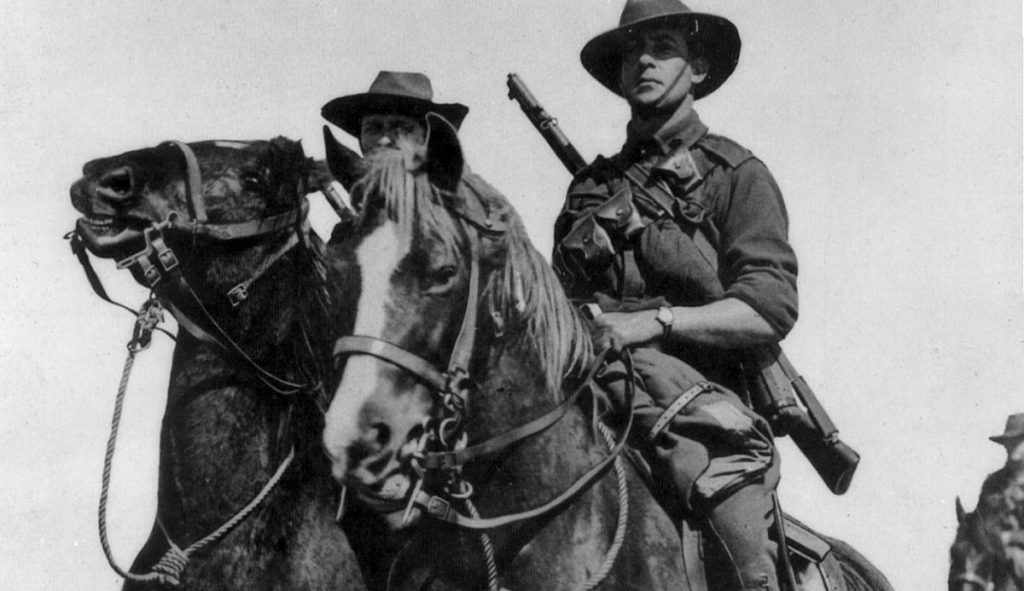Horses for the Army. Work at Wilston.
Source: The Telegraph: 15 September 1914
One of the busiest centres of military preparations in the metropolitan area is the remount depot at Wilston, where all the horses,bought and given, are received and examined by the military authorities. Colonel H. V. King lately was
appointed director of remounts,and he supervises the general operations. Major Cory is the principal Veterinary officer.
The depot is situated in a large paddock at Wilston, which generously was lent for the purpose by Mr R, Jackson, the well known carrier. The use of the land not only facilitated the organisation of the Queensland quota of the Australian Imperial Force but also enabled the Commonwealth Government to effect a considerable saving.
Captain A. F. Towers is the officer in command of the depot. He is a member of staff of Messrs John Cooke and Sons, who allowed him to undertake military duties in the remount department. He possesses special qualifications
and has had extensive experience in remount work, having been attached to the staff of Colonel Hunt, 7th Hussars, principal remount officer for Australia during the Boer war. Captain Towers not only shipped horses to South Africa, but went with them, in command of 80 men, and he holds the record for delivering horses in a fit condition to take the field.
The depot was started on the 17th August, in conjunction with the general preparations made for the dispatch of the first expeditionary force. To date 1,246 horses have been received,examined, branded, and numbered. The various units in the concentration camp at Enoggera have been supplied with 1,041 animals, which included the allocations to the artillery, the Army Service Corps, the Army Medical Corps, the infantry and light horse. The horses distributed among the units are very fine types, and reflect the greatest credit upon the officers responsible for their selection.
The public manifests more interest in camps and marches where military eclat dazzles the eye, and drill displays command attention; but not many civilians realise the immense importance of the unostentatious, yet solid and valuable work performed by the remount depart ment. A force without horses could not move;even the prevalence of motor traction has not depreciated the value of horses in the constitution of armies. Therefore, mobility largely is dependent on good horse flesh, and this great fact constantly has been kept to the fore at Wilston depot. The arrangements for classifying the horses are admirable, and operate with the precision characteristic of the military.
The paddock is subdivided into sections for railing in the horses. One area is reserved for animals that sicken, and isolation yards accommodate those that are suspected of having contracted diseases. Looking after a large collection of horses, with sick lines attached, entails a good deal of labour andhe keenest, attention to details. Captain Towers,assisted by 25 men, has discharged the various duties with satisfactory success, his working hours ranging from sunrise to midnight.
The first 300 horses purchased for transport and artillery are said to have been “very well bought,” Sir Robert
Jackson acting as purchasing officer. It is stated that his buying was, very satisfactory, the expenditure being nearly £1,000 under the cost estimated by the Commonwealth Government. He was assisted by the principal veterinary officer, who made a very careful inspection of the animals. About 378 gift horses passed through the depot, but some, of them were not all suitable for military work. These were sent to the saleyards, and realised sufficient cash to buy a few good gun teams. Squatters in the country forwarded some very good horses.
Many were very suitable,but some, being unbroken, could not take the field. The animals now arriving at the depot, in consequence of the better knowledge of the stamp required, confirm to all the requirements of the army. A splendid mob of 17 were received a few days ago from the Hon. A. H. Whittingham, M.L.C.. They were described as “a very nice lot,” and, personally, were inspected by Colonel Lee. D.S.O. (commandant), who, with Major Mailer, D.A.Q.M.G., visits the depot almost daily. Captain Findlay, veterinary officer attached to the depot, is kept busy looking after a collection of horses that are suffering from influenza, and other complaints. It is understood, that this officer will be attached to the army service unit of the expeditionary force.
The American lasso is used in catching the horses, and there are some men in camp at the depot who use the rope with great skill. Among those who visited the place last week, was Professor Skuthorpe, who also gave a demonstration of tying horses in various ways, at the Enoggera camp.

